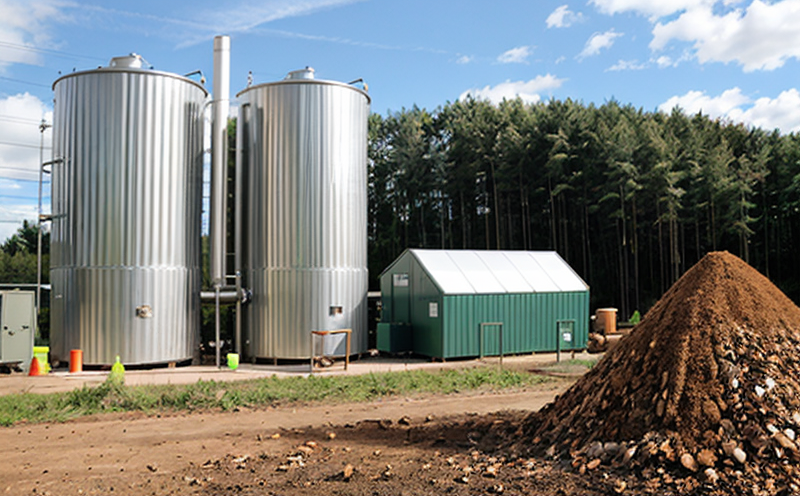ISO 16968 Alkali Metals in Waste-to-Energy Feedstocks
The ISO 16968 standard provides a robust methodology for determining the alkali metals content in waste-to-energy (WtE) feedstocks. This service is critical for ensuring compliance with environmental regulations and optimizing energy conversion processes. Alkali metals, particularly sodium (Na), potassium (K), and lithium (Li), can significantly impact the performance of WtE facilities by affecting combustion efficiency, slag formation, and emissions.
Alkali metals are naturally present in a variety of waste materials including municipal solid waste, biomass residues, and industrial by-products. Their concentration can vary widely depending on the feedstock source, which underscores the importance of accurate testing for regulatory compliance and process optimization. This service ensures that WtE facilities meet stringent emission limits set by environmental regulations such as the EU's Waste Framework Directive (2008/98/EC) and the US Clean Air Act.
The ISO 16968 method involves several key steps: sample preparation, digestion, and quantification using inductively coupled plasma optical emission spectrometry (ICP-OES). Sample preparation typically includes homogenization of the feedstock to ensure representativeness. Digestion is performed using a strong acid mixture, followed by dilution for analysis. The ICP-OES technique allows for precise measurement of alkali metal concentrations with high sensitivity and accuracy.
For R&D engineers, this service provides critical data on how different waste materials influence the combustion process. Understanding alkali metal content helps in optimizing feedstock blending to enhance combustion efficiency while minimizing slag formation. For quality managers and compliance officers, accurate testing ensures that WtE facilities comply with stringent environmental regulations. This is particularly important for biomass-based fuels where alkali metals can lead to fouling of equipment and increased maintenance costs.
The service also supports procurement activities by providing data on the quality and consistency of feedstock supplies. By ensuring compliance with ISO 16968, WtE facilities can avoid costly penalties associated with non-compliance and maintain a positive reputation for environmental stewardship.
In summary, the ISO 16968 standard is essential for accurate determination of alkali metal content in waste-to-energy feedstocks. This service supports critical decision-making processes across various sectors including energy generation, environmental compliance, and procurement. By adhering to this standard, WtE facilities can optimize their operations while meeting regulatory requirements.
Applied Standards
The ISO 16968 standard is widely recognized for its reliability in determining alkali metal content in waste-to-energy feedstocks. This method aligns with international best practices and ensures consistent results across different laboratories. The standard specifies the use of ICP-OES for quantification, which offers high precision and accuracy.
The application of ISO 16968 is particularly relevant for facilities that handle a diverse range of waste materials including municipal solid waste, biomass residues, and industrial by-products. By following this standard, WtE facilities can ensure consistent and accurate measurements of alkali metal content, which is crucial for optimizing combustion processes and meeting environmental regulations.
The method described in ISO 16968 includes detailed procedures for sample preparation, digestion, and quantification. Sample preparation involves homogenization to ensure representativeness, followed by digestion using a strong acid mixture. This step is critical for breaking down complex waste materials into simpler forms that can be analyzed accurately. The quantification process uses ICP-OES, which provides precise measurements of alkali metal concentrations.
The standard also includes acceptance criteria and quality control measures to ensure the reliability of test results. These criteria are essential for maintaining consistency in testing across different laboratories and ensuring compliance with environmental regulations. By adhering to these standards, WtE facilities can achieve optimal combustion efficiency while minimizing slag formation and emissions.
Benefits
- Environmental Compliance: Ensures that WtE feedstocks meet regulatory requirements for alkali metal content.
- Operational Optimization: Provides data to optimize combustion processes and minimize slag formation.
- Cost Efficiency: Reduces maintenance costs associated with equipment fouling from high alkali metal concentrations.
- Reputation Enhancement: Maintains a positive reputation for environmental stewardship by adhering to strict standards.
- Informed Decision-Making: Supports critical decisions on feedstock blending and process optimization.
- Regulatory Certainty: Provides consistent results that are recognized internationally, reducing the risk of non-compliance penalties.
Eurolab Advantages
At Eurolab, we offer unparalleled expertise in waste-to-energy feedstock testing. Our team of certified analysts ensures that your samples are handled with the utmost care and precision. Leveraging state-of-the-art ICP-OES equipment, our laboratory provides accurate and reliable results that meet international standards.
We pride ourselves on our commitment to quality and customer satisfaction. Our advanced facilities and experienced staff ensure that every test is conducted according to ISO 16968 guidelines. This service supports your facility's compliance efforts and operational optimization, providing critical data for informed decision-making.
Our services are tailored to meet the specific needs of WtE facilities, supporting their environmental compliance and operational efficiency. By choosing Eurolab, you gain access to a network of experts who understand the unique challenges faced by your industry. Our commitment to excellence ensures that you receive accurate, timely results every time.





